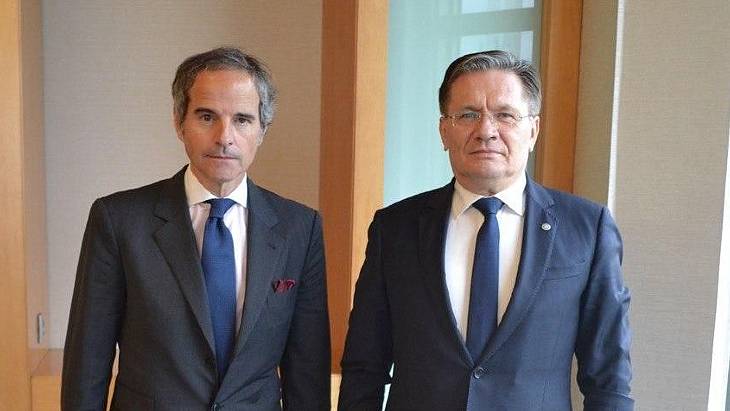The IAEA, in its daily update on Ukraine on Wednesday, said that the director general was "continuing timely and professional discussions where he stressed the urgency of ensuring the safety of Ukraine’s Zaporozhe nuclear power plant. The IAEA is ready to play its indispensable role, he added."
Rosatom said in a statement issued after the meeting: "The officials reviewed the entire agenda of the Russia-IAEA working relationship. In particular, the parties discussed in detail the matter of ensuring safety of nuclear facilities in Ukraine under current complicated circumstances."
It said the two men "paid particular attention to the state of affairs" at Zaporozhe "including taking into account the IAEA director general’s intention to organise a technical mission of the IAEA specialists to this NPP. In turn, when discussing the aforementioned range of issues, Alexey Likhachev stressed ensuring safe operation of nuclear installations in the broadest sense possible was an absolute priority for the Russian side and for the Russian nuclear industry. The parties agreed to continue regular contacts."
Zaporozhe is the largest nuclear power plant in Ukraine - and Europe - with six power units. It has been under the control of Russian forces since early March, although it continues to be operated by Ukrainian staff. Concerns have been raised about safety at the plant, and the IAEA has been seeking to visit it to help secure safety measures.
The IAEA director general, who visited Ukraine last week and held talks with the country's president, said the situation at Zaporozhe was at the "top of my list of concerns" but said there were "profound political implications" of getting access for inspections because it was a Ukrainian nuclear power plant, but under the control of Russian military forces.
In its daily updates on Thursday, Ukraine's nuclear power plant operator Engeroatom said that all four nuclear power plants in the country continued to operate safely within normal safety limits. The IAEA also said that it was now receiving remote monitoring data once again from Chernobyl, after two months of disruption.
Meanwhile, following the end of the Russian occupation of Chernobyl and the surrounding area, and the IAEA inspectors' visit last week and the resumption of regulatory control by the State Nuclear Regulatory Inspectorate for Ukraine (SNRIU), dust suppression work resumed at Chernobyl. An updated posted on the Chernobyl SSE website, said: "During 1-2 May 2022, personnel of the NSC (Objects Shelter) Operation Shop successfully carried out dust-suppression works (feeding of localising dust-suppressing solution (DSS) AK-510 into the space under the shelter’s roof) using the upgraded dust-suppression system.
"These works included making the dust-suppression formula and rinsing solution, analysing the content of Gadolinium in the rinsing solution, testing (determining the viscosity) of dust-suppression solution, feed in of the solution into the working area of the system, washing of pipelines and injectors with the rinsing solution followed by draining of the residues of the composition and rinsing solution into the drain tank.
"These works serve to limit the dissemination of radioactive substances under the shelter’s roof space within the dust-suppression system’s area of coverage."
However it also emerged, via another update, that SNRIU has suspended some licences at Chernobyl, a decision said to have resulted from the impact of the occupation. The licences cover:
- activities at a lifecycle stage "decommissioning" of Chernobyl NPP units 1, 2, 3;
- activities "processing, storage of radioactive waste" (operation of the Liquid Radioactive Waste Treatment Plant);
- activities "processing, storage of radioactive waste" (operation of NSC-SO complex);
- activities "processing, storage of radioactive waste" (operation of the Temporary Storage Facility for Solid Waste of III Group (High-Level Waste), Low- and Intermediate-Level Long-Lived Waste (TSF for HLW and LIL-LLW));
- activities "processing, storage of radioactive waste" (commissioning of the Solid Radioactive Waste Retrieval Facility and Solid Radioactive Waste Processing Plant of the Industrial Complex for Solid Radioactive Waste Management; and
- activities on the use of ionising radiation sources.
Acting Director General of SSE ChNPP, Valeriy Seyda, criticised the decision, noting how they had managed to ensure safety and "maintained full control over the nuclear facilities, nuclear material and radioactive waste" during the period of occupation.
The statement on the website added that they were "confident" that the licences would resume and SSE ChNPP would "present evidence that the enterprise is able to comply with the conditions of the activity, set by norms and rules of the nuclear and radiation safety".








_94566.jpeg)






